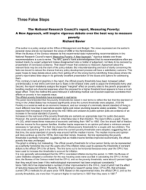
An official website of the United States government
Here’s how you know
Official websites use .gov
A .gov website belongs to an official government organization in the United States.
Secure .gov websites use HTTPS
A lock (
) or https:// means you’ve safely connected to the .gov website. Share sensitive information only on official, secure websites.
-
//
- Census.gov /
- Library /
- Census Working Papers /
- Three False Steps
Three False Steps
Three False Steps
Abstract
When the Bureau of the Census releases its first experimental data implementing recommendations in the National Research Council's report, Measuring Poverty: A New Approach, vigorous debate over those recommendations is sure to revive. The NRC panel's frank acknowledgement that its recommendations often are backed mainly by expert judgement makes disagreement also a matter of judgement, not likely to be resolved by presentation of conclusive evidence. That doesn't mean that evidence is irrelevant. Agreement about the relevant facts may be only the start of the policy debate. But misunderstanding and lack of clarity concerning the facts are bound to reduce the chance that any policy development process will have a satisfactory outcome.
This paper hopes to keep debate about policy from getting off on the wrong foot by identifying three places where the panel's report takes false steps in its generally excellent presentation of the issues and options for addressing them.
First, contrary to text and graphics in the report, the official poverty thresholds have been increased (albeit unintentionally) in real terms over time due to flaws in the inflation index used to adjust the thresholds every year. Second, the report mistakenly assigns the largest "marginal" effect on poverty rates to the panel's proposals for handling medical out-of-pocket expenses when the proposal for a higher threshold level appears to have a much larger effect. Third, the method the panel followed in estimating medical out-of-pocket expenses overstates their effects on poverty in two separate ways.
Share
Related Information
WORKING PAPER
Supplemental Poverty Measure Working PapersSome content on this site is available in several different electronic formats. Some of the files may require a plug-in or additional software to view.
 Yes
Yes
 No
NoComments or suggestions?


Top


